Romanian success or failure? – Why Macedonia is not Finland
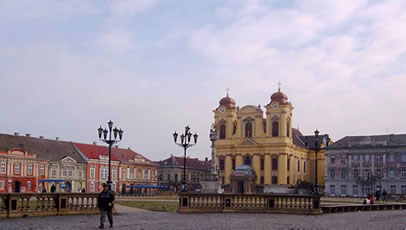 |
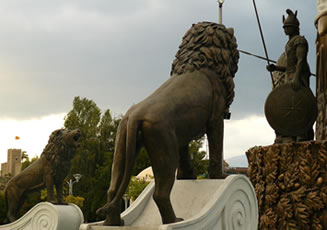 |
|
Timisoara – Skopje |
|
- How Timisoara weathered the crisis
- Where Belarus beats Germany – and why Macedonia is not Finland
- Upcoming events
Dear friends of ESI,
In 2010, former Romanian Justice Minister and later member of the European Parliament Monica Macovei told ESI:
"The accession process is a unique opportunity to carry out in 20 years transformations that would otherwise take a hundred. There is the technical expertise from the EC and the old member states, plus political and financial support. And there is this permanent pressure, which is crucial."
This raises an obvious question: if outside pressure works during a short "unique opportunity", can it also produce lasting change?
Today the conventional wisdom in European policy-making circles is that Romania's accession to the EU on 1 January 2007 came too early. But is it true?
In 2013, a Romanian journalist, Vlad Odobescu, won the top prize in the prestigious competition of the Balkan Fellowship for Journalistic Excellence with his article How to Get Ahead in Romanian Politics. It described a remarkable phenomenon:
"Across the country, mayors have been condemned in courtrooms, only to be resurrected at the ballot box. Their resilience exposes a paradox in the European Union's campaign to improve governance in its newest member states … In town councils and city halls, corruption trials have been the making of political careers, rather than their ruin ... The parliament elected last year was the most corrupt in Romania's history. Twenty of its 588 members are under investigation for misdeeds in office, and two have so far been convicted."
But while this suggested that political culture and popular expectations only change slowly, Odobescu went on to describe something no less striking: robust institutions fighting corruption and producing results:
"The national anti-corruption agency, known by its Romanian acronym, the DNA, was established in 2005. At the time, Bucharest was trying to convince Brussels that it was serious about tackling chronic corruption – a key proviso for entering the EU. Loosely overseen by the Supreme Court, the DNA was awarded extraordinary powers – including a dedicated wire-tapping and police unit that allowed it to sidestep the interior ministry.
The agency soon proved its worth … It made enemies in the political elite and won praise from Brussels. In 2012, the DNA indicted some 25 mayors, eight deputy mayors and four members of parliament. Its work led to the conviction of 743 people last year – double the number from the previous year. Roughly 90 percent of the agency's cases that were resolved in 2012 resulted in guilty verdicts. Those convicted included two members of parliament, a cabinet minister, nine mayors and three deputy mayors. Former prime minister Nastase was also convicted last year."
Odobescu concluded: "Given Romania's past, the real surprise may be the survival of the DNA, rather than the vitality of its targets." It seems that progress in building institutions is possible after all; and that a strict enlargement policy can play a vital part.
How Timisoara weathered the crisis
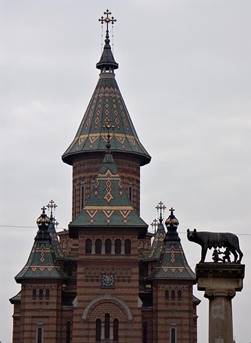 |
|
|
Timisoara |
|
What about the state of the Romanian economy? Romania remains, after Bulgaria, the poorest country in the EU. Recent years have been tough, there as in other parts of Europe. Yet looking at its economic performance in the decade since 2001, one sees a story of convergence comparable to that of Poland or the Baltic states.
Spectacular convergence? GDP per head 2001 - 2012
Current market prices (PPS, EU-28=100)
|
Country |
2001 |
Increase |
2012 |
|
Lithuania |
42 |
+30 |
72 |
|
Estonia |
47 |
+24 |
71 |
|
Latvia |
39 |
+25 |
64 |
|
Romania |
28 |
+22 |
50 |
|
Poland |
48 |
+19 |
67 |
|
Bulgaria |
30 |
+17 |
47 |
But is the dream of convergence still alive today? Almost all of it took place in the years before 2008. Once the European economic crisis hit Romania, salaries ceased to rise. So what happened then?
Over the last years, ESI has conducted intensive field research in Timisoara in Western Romania, close to the country's borders with Hungary and Serbia. The film Timisoara.com, produced in 2008 based on our research, showed dramatic change – a city attracting foreign investment, many domestic entrepreneurs – and big challenges, from dealing with the past to poverty and corruption.
In late 2013, ESI's Kristof Bender returned to Timisoara. We wanted to see how the city had been affected by the current economic crisis. What we found is surprising, and described in our new essay:
ESI essay – Timisoara 2.0 (May 2014)
In 2008 Timisoara first saw the collapse of its construction sector. The bankruptcy of many smaller and medium-sized enterprises followed. And yet most factories in Timisoara were quickly back to full production. Today the unemployment rate is again below 2 per cent:
"Dan Diaconu, deputy mayor of Timisoara, has an unusual problem. 'Unemployment in our city stands at one per cent,' the 36-year-old, elected in 2012, explains. 'This is a problem for attracting new investors. Some are scared away by this fact.' In conditions of near full employment, labour is hard to find. Yet this is a problem that most European cities would long to have. Diaconu concedes, with no sign of enthusiasm, that in his city of 320,000 people, 'the economic indicators show that indeed there is no big crisis in Timisoara today'."
With its focus on manufacturing and exports, Timisoara weathered the economic crisis much better than less industrial areas of South East Europe. Instead of collapsing, its industrial sector restructured. Simple production (shoes) left Timisoara. More sophisticated production took its place.
Peter Hochmuth is a German businessman who came to Timisoara 12 years ago as the financial director of the Continental tire factory. Today he advises foreign investors and – more recently – Romanians on doing business with foreigners.
"'In the simplest sectors, Timisoara cannot compete anymore,' claims Hochmuth. 'But it is competitive in the higher skilled production processes where you have to work closer with your clients. Take software system development. Engineers here earn at least €700 a month, much more than their colleagues in low-cost countries. But you can easily and cheaply fly a team from here to Germany, Austria or Italy. Many speak German, Italian or good English. They know what a consumer expects. They have the same way of thinking. Eventually, everything considered, it pays off to be here for these more sophisticated production activities.'"
This is a story of change and resilience, not failure.
Timisoara 2.0 is the first essay in our new series
"Return to Europe revisited" supported by ERSTE Foundation.
Where Belarus beats Germany – and why Macedonia is not Finland
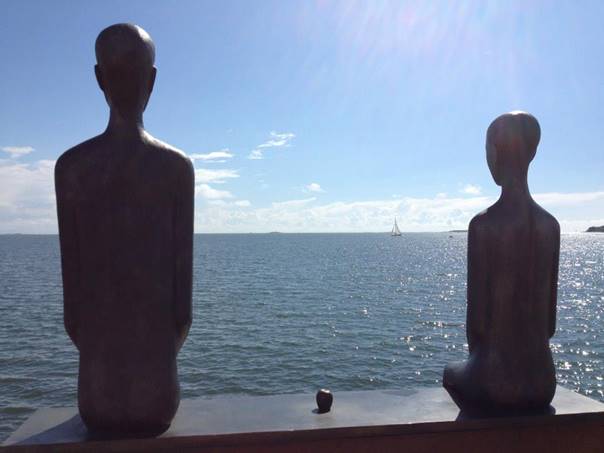 |
|
|
Sculpture in Helsinki: "Happiness". Elusive in Macedonia |
|
Romania's economic development has long been better than its reputation. In the case of Macedonia, the opposite has been true for years.
Macedonia is a star performer in the World Bank's Ease of Doing Business Index. Already in 2008 Prime Minister Nikola Gruevski told ESI:
"We are now focused on NATO, on the European Union … and on improving the business climate. According to the 'Doing Business' edition of 2008 of the World Bank, among 178 countries we are in 4th place according to positive reforms of the business climate in 2007."
Macedonia has since been unable to join NATO due to a Greek veto. It has made no further progress towards the EU for the same reason. However, it has been a stellar success in the eyes of the World Bank. In 2012, the World Bank presented the top ten countries where the business climate had improved most since 2003:
World Bank Doing Business 2013
(page 9)
Georgia
Rwanda
Belarus
Burkina Faso
Macedonia
Egypt
Mali
Colombia
Tajikistan
Kyrgyz Republic
ESI has long been critical of the World Bank Doing Business Survey. This is a particularly curious list, however. It gets even more curious the closer one looks.
World Bank experts found that in 2012 there was no member state of the European Union where it was as easy to start a business or to register property as it was in Belarus. They concluded that an investor was better protected in Minsk (82nd position in the world) than in Munich or Frankfurt (100th position).
Georgia, the wunderkind of Doing Business, was ahead of all but two EU members in terms of the ease of doing business, although it was still the second poorest country in Europe after Moldova.
The World Bank also found that the business climate in Macedonia was better than in Switzerland, the Netherlands and Japan. Only, what does this actually mean?
Macedonia remains today one of Europe's poorest countries, failing to create jobs and continuing to fall behind. Annual GDP per capita stands at €3,600, compared to €25,000 for the EU. Macedonia's average monthly income per capita is only €120. The employment rate stands at 44 per cent. The average rate for the EU is 64 per cent – a dramatic 20 per cent difference. The 2012 Gallup Balkan Monitor data showed that "a quarter (24 per cent) of Macedonians had experienced times in the last 12 months when they could not afford to buy food for themselves and family. Across the Balkans, only Albania and Kosovo (27 per cent and 29 per cent respectively) had worse figures." Income distribution in Macedonia is also one of the most unequal in Europe.
In two new essays on Rumeli Observer we compare Macedonia to another small European nation: "Why Macedonia is not Finland?" The first essay looks at education policy results and notes:
"It is not this or that aspect of Finnish education, public administration or industrial policy that matters most … The real and significant difference between Macedonia and Finland are the issues people – decision makers, parents, teachers – consider important enough to wrestle with until they find incremental improvements."
The second essay – On mousetraps and romantic nationalism – concludes:
"Perhaps we can now answer the question why Macedonia is not Finland. It lacks the national narratives that celebrate pragmatism, ordinary people, education and teachers as the national heroes of the future. It is not following where Finland led one century ago in the field of women's empowerment. It is not turning away from romantic nationalism but celebrates it.
One day leaders will emerge in the Western Balkans who take pride in building museums of science and design instead of temples to dead warriors and bandits. But when this will happen remains to be seen."
In recent months ESI analysts have talked to dozens of people in Macedonia as part of a project funded by the Dutch Ministry of Foreign Affairs. We also presented proposals in many EU capitals on how to break out of the current stalemate, most recently meeting with Croatian foreign minister Vesna Pusic in Zagreb. In early June we will present our findings in Skopje.
Upcoming events
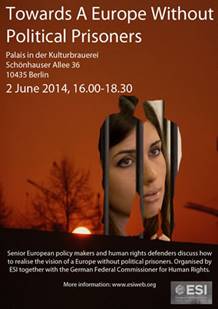 |
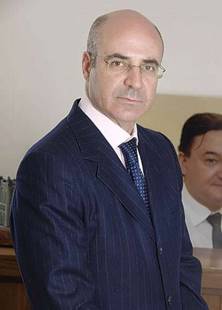 |
|
ESI Berlin event 2 June – Bill Browder, father of the Magnitsky list |
|
In the next days ESI analysts will present our research in many different cities:
On 28 May Alex and Gerald will talk about the future of visa liberalization at a conference organised with IKV in Istanbul.
On 28 May Kristof will be in Bratislava to meet Miroslav Lajcak, Deputy Prime Minister and Minister of Foreign and European Affairs of the Slovak Republic, to present ESI's ideas on the future of the EU enlargement process.
On 29-30 May Alex, Besa and Gerald will conduct an ESI capacity building seminar in Istanbul – Inside the ESI kitchen: How to help Turkey get visa-free travel.
On 2-3 June ESI is organising a big international debate and workshop "Towards a Europe without political prisoners". Please join us for the public event in Kulturbrauerei on 2 June at 4 pm.
On 5-6 June Gerald will present ESI's newest analysis and recommendations in Skopje, and talk about "Is EU enlargement dead? And does it matter?"
On 10 June Gerald will debate the future of Bosnia policy with Kurt Bassuener at a closed policy event hosted by the Permanent Representation of the Netherlands in Brussels.
12 June will be the annual meeting of the European Council on Foreign Relations in Rome.
We hope to see some of you at these events.
Many best regards,

Gerald Knaus
- NEW ESI essay: Timisoara 2.0
- NEW – Nigar Goksel in New York Times on LGBT rights and Turkish prisons
- NEW Rumeli Observer on Macedonia:
